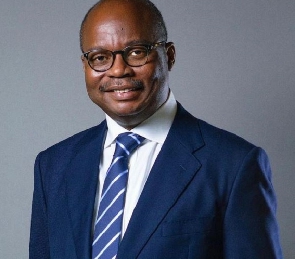The Bank of Ghana Governor, Dr. Ernest Addison, has called for improvements in the International Monetary Fund’s (IMF) lending framework to enhance the African continent’s access to resources in a challenging environment.
This comes at a time when domestic policy efforts alone are inadequate to sustainably address debt burdens and restore macroeconomic stability on the continent.
Speaking at the 2023 Africa Consultative Group Meeting with the IMF Managing Director, Kristalina Georgieva, in Washington, D.C., Dr. Addison noted that the global policy dialogue should focus on Africa’s debt sustainability, long-term investment needs, macroeconomic resilience to shocks, and laying the foundation for inclusive and job-rich growth.
Dr. Addison urged the IMF to consider increasing concessional financing to the continent by modifying the access thresholds, expanding access limits, and relaxing eligibility criteria for poverty reduction and growth trust (PRGT) resources. He stated that this will ensure timely financing assistance to the most vulnerable members.
“This will ensure timely financing assistance to most-vulnerable members. It is in this context we welcome the Fund’s decision to temporarily raise the annual and cumulative limit in the General Resources Account (GRA) to 200 percent and 600 percent of quota respectively for a period of 12 months,” Dr. Addison said.
“Nevertheless, we underscore the importance of aligning PRGT access limits with those of the GRA to enhance Fund support to PRGT-eligible members facing acute debt challenges, while strengthening fundraising efforts to bolster the PRGT resource envelope,” he added.
Africa’s economies have accumulated debt rapidly over the past decade to address developmental and infrastructural needs. The World Bank Group (WBG) World Debt Report (2022) estimates sub-Saharan Africa’s long-term external debt stock at US$636billion at the end of 2021, with 19 of the 35 low-income countries either in or at high risk of debt distress.
Some countries, including Ghana, are completely shut out of the international capital market. If unaddressed, the overall debt situation is expected to worsen in 2023 and further constrain the capacity of many member-countries to raise the needed funding to deliver broader social protections and respond to climate change.
The COVID-19 pandemic, the war in Ukraine and the tightening of financing conditions have all acted in concert to expose Africa’s heightened debt levels, as well as elevated debt-service costs and rollover risks. Recurrent climate-related disasters are also adding to the already acute fiscal and debt problems on the continent.
Dr. Addison mentioned that African countries remain committed to pursuing credible fiscal consolidation, anchored on efficient expenditure rationalisation and robust domestic revenue mobilisation measures.
“This will help build buffers for critical social interventions and infrastructural development while safeguarding medium-term debt sustainability. To boost fiscal resilience, members are undertaking measures to improve public financial and investment management, enhance fiscal transparency and governance, address corruption risks, and progressively phase out non-targetted subsidies,” he said.
Efficient debt management practices; consolidating debt data in a centralised system; publishing reliable, comprehensive and timely debt information; and deepening domestic debt and capital markets are all necessary to foster greater access to long-term finance. However, domestic policy efforts alone are inadequate to sustainably address the debt burden and restore macroeconomic stability on the continent.
For this reason, Dr. Addison called on the IMF Managing Director – stating that much stronger support is needed from the Fund to prevent the region’s debt levels from spiralling out of control.
Dr. Addison urged the Fund to continue engaging closely with other international financial institutions and creditors to strengthen the multilateral framework for dealing with Africa’s debt distress in a timely manner. He suggested that the G20 Common Framework (CF) should be enhanced to deliver swift, predictable, transparent and equitable debt resolutions while permitting debt service suspension during negotiation to offer instantaneous relief to debtors.
Business News of Thursday, 20 April 2023
Source: thebftonline.com

















